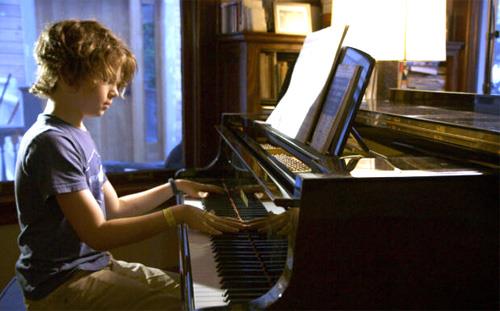
Both Ludwig Van Beethoven's greatest gift and his greatest burden take on a poignant contemporary resonance in Moonlight Sonata: Deafness in Three Movements, which premieres Wednesday at 9 p.m. ET on HBO.
Beethoven, composer of some of the Western world's most powerful and enduring classical music, began losing his hearing at 26 and was completely deaf by his mid-40s.
He could not hear his own music except, as he noted, in his head.
Moonlight Sonata uses that Beethoven composition to propel the story of Jonas Brodsky, a young present-day piano player who lost his hearing before he was old enough to start school.
Jonas, now 13, began playing the piano at 5 and is accomplished enough to appreciate and perform "Moonlight Sonata" both the way Beethoven wrote it and the way he hears it himself.
Moonlight Sonata doesn't paint Jonas as a perfect prodigy. He gets frustrated when he makes mistakes. He gets reprimanded for behaving like a kid. He talks about how sometimes he likes to play the piano by himself, so that when he makes a mistake he can just keep playing.
It's the kind of nuanced child portrait you might get from an honest parent, which happens to be exactly what's going on here. Moonlight Sonata was filmed by Irene Taylor Brodsky, Jonas' mother, who is also in a unique position to intertwine Jonas' story with that of her parents Paul and Sally Taylor, both of whom were deaf.
Jonas forms a particularly close bond with Paul Taylor, who becomes his guide in the deaf world.
Yet the deaf world of the 21st century, Irene Brodsky makes clear, is a very different world than the one in which Paul and Sally Taylor grew up.
When Paul Taylor was diagnosed as deaf, at the age of 3, the Birmingham school system told his parents it couldn't take him. So he was sent to a school for the deaf, 600 miles north. That school didn't believe in signing, so he spent years learning to speak through complicated and difficult vocal imitation.
Jonas, in contrast, has cochlear implants. He got his first when he was 5 or 6, the second when he was 8 or 9. They enable him to hear, and he can speak with "normal" inflection.
He mentions at one point that he sometimes turns off his implants because he likes the silence in his head. But like the Taylors, he acknowledges that growing up deaf today can be far easier than it was for his grandparents, never mind in Beethoven's time.
Beethoven, whose 250th birthday anniversary next year will launch a series of events and celebrations, doesn't get a biographical retrospective here. Instead Irene Brodsky weaves his music throughout the story, often by having Jonas play it.
While Paul and Sally Taylor had limited opportunity to be musical themselves, they provided music to their children. That's among the many things for which Irene Brodsky tips her hat to them.
Brodsky sets a difficult task, weaving timeless art into a story of generational affection, technological progress and the ability of human beings to make the most of a tough hand. In a world that's too often loudly depressing, Moonlight Sonata is quietly inspirational.